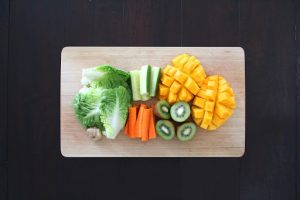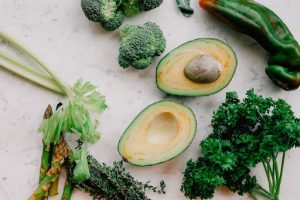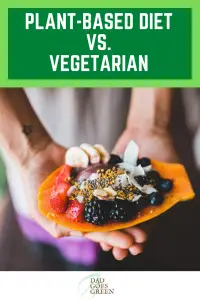When you are thinking of plant-based diet vs. vegetarian, you are probably lost. At first glance, these diets seem very similar. The truth is, they are. However, there are some important differences that we will explain below. Here’s your guide handbook to understanding plant-based diet vs. vegetarian diets:

What Is A Vegetarian Diet?
If you are looking for a simple answer, this might be disappointing for you. The truth is, there is no single definition of a vegetarian diet. There are six different types of vegetarianism, one of which is a popular vegan diet.
Put simply, all these diets avoid animal products to some degree.
There are around 375 million people who are vegetarian, which is around 5 percent of the global population. Though the number is slow, it’s growing steadily. There is a rising interest in vegetarian and vegan diets, even from people who still enjoy steaks.
Are Vegetarian Diets Healthy?
You bet they are! It’s for a good reason that our parents forced us to eat veggies and fruits when we were little. Vegetarian diets are full of vitamins and minerals that you need to live a long, healthy life.
The power of plant-based foods, especially vegetables, can be observed on a day to day basis. We all have those days when we load ourselves with junk food and do not touch fruits and vegetables. The result? A slumpy you, caring for your food baby on your couch.
Though we all have these moments and its a-okay, consider a different scenario. Vegetarians often have higher levels of energy for longer periods of time. This is because meat, the primary source of protein on a regular diet, is harder to digest.
Your body needs a lot of energy to break the meat down. Thus, you often end up feeling tired after you eat. Plant-based proteins, on the other hand, are digested easily. Hence, with a proper vegetarian diet, you are likely to be more productive throughout the day.
A vegetarian diet has many more health benefits which we will get into later. From heart health to cancer, you can’t go wrong with choosing plants over animals.

Vegetarian Diet Types
As I mentioned, there are six types of vegetarian diets. It’s important to distinguish between them when looking at plant-based vs. vegetarian approaches. Let’s take a look at them together.
Vegan
Everyone’s heard about this one. A vegan diet is a part of a vegan philosophy that goes beyond just your diet. Veganism brands itself as a cruelty-free lifestyle. Hence, the main motivation of the movement is animal liberation.
Recently, more people go vegan for environmental reasons. Research shows that industrial animal farming damages the environment, thus exacerbating the issue of global warming. As the awareness of the changing climate increases, so does the number of vegans.
A vegan diet strictly excludes all animal-based foods. Not in a ‘kind of sort of’ way. For real. Vegans don’t eat any meat or dairy products, as well as any animal by-products. They also don’t eat honey, which can be a debated subject amongst the nutrition gurus.
Pescatarian
As you can probably guess, a pescatarian diet also eliminates meat. In this instance, you are allowed to eat some fish but you shouldn’t eat any meat or poultry. You can also consume small amounts of dairy and eggs.
Many people choose a pescatarian diet because it is easier to control the intake of protein. Fish is a good source of protein and other nutrients, such as calcium and iron. Though you can get those from plant-based foods, eating fish can be an easy way out.
Ovo-Vegetarian
Have you ever studied Latin? Me neither. In any way, ‘ovo’ means ‘egg’ in Latin. Hence, ovo-vegetarians do not consume any meat, poultry, or dairy products, but do eat eggs. As with any vegetarian diet, it can be difficult to get all the nutrients you need, especially protein.
An ovo-vegetarian diet is another easy way out. While doing something good for yourself (more on this later) and for the planet, you can still enjoy protein-rich eggs. Or maybe you are just a fan of eggs for breakfast. In any case, this may be your option.
Lacto Vegetarian
Another twist in a vegan-like diet. A lacto vegetarian diet avoids meat but allows dairy. This includes cheese, yogurt, kefir, butter, cream, and other dairy products. In Latin, ‘lac’ means milk. Hence, the name of the diet.
This may be a bad option for someone who doesn’t tolerate lactose. If you digest dairy just fine, go ahead and try it out.
Lacto-Ovo vegetarian
Can you guess? Yes, it’s a combination of the previous two diet spinoffs. While you still can’t eat meat, fish, or poultry, you can eat some dairy and eggs.
Flexitarian
This diet is a little weird, you gotta admit. A flexitarian diet is a less strict version of all previous vegetarian diets. It can occasionally include some types of meat, dairy, and eggs. Nevertheless, plant-based foods continue to be the primary source of nutrients.
Some believe that a flexitarian diet is a better alternative to most restrictive diets. Research shows that 84 percent of vegetarians eventually go back to eating meat. As the study explains, this mostly happens because people cut down meat entirely right away.
The sudden transition makes it harder for you to follow up with your desired habit. Just think of any strict diet you’re ever had to follow. Or, the last time you made a promise to yourself to work out every single day. Maybe, small steps lead to better journeys ahead.
The point is, even though this diet sounds relaxed and counterproductive, it actually may be the best option. You will get used to eating fewer animal foods and by-products. Then, you can fully transition to even veganism.

Protein For A Vegetarian Diet
It can be challenging to have a sufficient intake of protein when not eating meat. At the end of the day, meat has the most amount of protein.
Don’t worry, you still have options! The most common vegan-friendly sources of protein are:
- Tofu
- Lentils
- Chickpeas
- Beans
- Hempseeds
- Quinoa
- Soy milk
- Oats
Reasons To Eat Vegetarian
From religion to health, there are a variety of reasons for you to transition to a vegetarian diet.
Religion
In some parts of the world, religion plays a big role in one’s diet. An example of this is Hinduism, which is the oldest religion in the world, primarily practiced in India and Nepal. Buddhism, another religion that originated in India, treats meat similarly to Hinduism.
Though these religions don’t enforce a vegetarian diet, the holy scriptures and traditions promote abstaining from meat. Both religions encourage to minimize the suffering of all living things. You probably know that in Hinduism, a cow is a sacred symbol being.
It’s a symbol of life, as some scriptures associate a cow with the mother of all gods, Aditi. Hence, 30 to 40 percent of Indians follow a vegetarian diet. That’s one big difference between plant-based diet vs. vegetarian diet.
Another religion that prohibits meat is Islam. According to its holy scripture – Quran – Muslims cannot eat “meat from animals that die of themselves, blood, [and] the meat of pigs”. Most Muslims take this seriously and abstain from pork, even if they eat other types of meat.
Ethics And Morality
Many people choose to become vegetarian because of the concern for animals. Some vegetarians believe that killing animals for food is cruel and unjust.
Vegans are especially outspoken about this issue. They advocate against any exploitation of animals, not only in the food industry.
Recently, many animal farms try to adjust to public concerns. Many brands promote their products as organic, cruelty-free, and grass-fed. This can be a better option for egg industries. It is possible to minimize harm when producing eggs.
In other industries though, where you need to kill an animal, there isn’t much one can do. Some businesses promote the idea of ethical farming and natural conditions for animals before they are slaughtered. But at the end of the day, slaughter is slaughter.
If the issue of animal cruelty ever bothered you, vegetarianism might be a perfect fit for you.
Environmental Concerns
By now, it is a fact that mass livestock farming deteriorates the environment. No matter how you feel about meat, it’s bad for the planet. Everyone has heard about greenhouse gases, which continue to warm up our planet.
18 percent of all greenhouse gases that come from human activity actually come from industrial animal farming. To give you some perspective, that’s more than emissions from all available transportation methods combined. And that’s a lot of greenhouse gases.
Also, animal farming on a large scale requires massive amounts of water and land. Thus, meat production is highly unsustainable. One kilogram of beef needs 15,000 liters of water, which is a huge amount.
Though this may not seem like a big problem for you, poorer countries struggle from not having enough drinking water. Essentially, there is a better use of water than feedings the animals that are about to get slaughtered.

Benefits to Vegetarian Diet
There are many benefits to choosing a vegetarian diet. As we are mostly concerned with healthy living, let’s focus on the health benefits of vegetarianism.
Any type of a vegetarian diet significantly decreases your chances of getting cardiovascular diseases. Meat has been repeatedly linked to heart diseases because it contains a lot of unhealthy fats. Thus, cutting down on meat may be a good idea.
Studies by the World Health Organization show some evidence that red and processed meats are associated with some cancers. In particular, colorectal cancer, as well as pancreatic and prostate cancers. Clearly, a vegetarian diet reduces your risk of developing some type of cancers.
Vegetarian diets are rich in plant-based foods, which are typically healthier by most metrics than animal foods. Thus, they may help you lose weight. Research shows that vegetarian diets may help with obesity-related diseases, as well as obesity itself.

What Is A Plant-Based Diet?
A plant-based diet is very similar vs. vegetarian diet. It mostly consists of fruits and vegetables, as well as whole grains, legumes, and nuts. Though it doesn’t strictly enforce the no-meat rule, it does encourage people to eat as many plant-based foods as possible.
Thus, it shifts the attention away from animal products to plant-based foods. It pushes you to focus on fruits, vegetables, legumes, and whole grains, instead of anything else.
Health Benefits Of A Plant-Based Diet
There are a variety of health benefits that come from a plant-based diet vs. vegetarian. Just like a vegetarian diet, it typically involves less or no meat consumption, thus benefiting both the planet and yourself.
A plant-based diet is awesome for your immune system, as it contains many nutrients that are mostly found in plants. Vitamins, minerals, and antioxidants in plant-based products make you stronger and help you fight infections when the time comes. As I am writing this in the midst of a pandemic, this point is more important than ever.
A plant-based diet can also reduce inflammation, which is your body’s response to harmful stimuli, like an infection. Though this is an important process, sometimes it can be chronic, which is very harmful. Continued inflammation can damage your tissues and cells.
If you have ever struggled with this, a plant-based diet may be a good choice for you as it has anti-inflammatory effects.
A plant-based diet has all the same health benefits as vegetarian diets. A plant-based diet reduces your risks of cancer, obesity, and cardiovascular disease. It’s good for your body, and for the planet.
Differences In Vegetarian vs. Plant-Based Diets
The truth has to be told: these diets are extremely similar. If you are wondering why there are so many terms for diets that are essentially the same, I got you. Though the foods consumed are very similar, the approaches are slightly different. Hear me out.
A vegetarian diet focuses on reducing the amount of meat or other animal foods you eat. That’s the whole purpose of this diet. Thus, a vegetarian diet actually allows you to eat processed snacks, fast foods, and other refined foods.
As long as these foods don’t come from animals, you’re fine. A plant-based diet vs. vegetarian diet, on the other hand, isn’t concerned as much with the detrimental effects meat has on your health. Instead, its focus is on the plant-based foods and their benefits. This can be confusing.
Basically, the main goal of a vegetarian diet is to reduce the consumption of animal-based foods because they are bad for you. A plant-based diet focuses on increasing your consumption of plant-based foods because they are good for you.
Vegetarian Diet Pros And Cons
Pros
- You may reduce your risks of cancer, cardiovascular diseases, obesity, and type 2 diabetes! If, of course, you don’t consume processed and refined foods.
- You are likely to lose weight!
- You will not contribute to the exploitation of animals!
- You will reduce your carbon footprint!
- You will save money because eating plants is cheaper than eating animals!
Cons
- If the diet is not properly planned, it may lead to protein, iron, B12, or calcium deficiencies.
Plant-Based Diet Pros And Cons
Pros
- You will be healthier!
- Your risks of various diseases will lower!
- You may lose weight!
- You will positively contribute to the environment and the climate change problem!
- You will save yourself some money!
Cons
- It can be difficult to have a sufficient intake of protein and iron
- … thus, possible deficiencies.
- Some people may find meal preparation to be more difficult.
It is on you to decide which diet is best for you because there is no right answer. Regardless of what you go for, you will do something good for the plant and for yourself!
You may also like: CAN I EAT BREAD ON A PLANT BASED DIET? >>CLICK HERE!
Below is a Pinterest friendly photo…. so you can pin it to your Veggie Board!!











